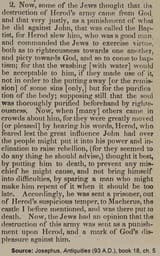Search Results
6/9/2025, 7:43:35 AM
>>17749028
>which rests on the claim that the archive where Eusebius found it was the most secure site in the Roman world for the entire 300 year span since Jesus, so it's impossible for a spurious document to get in there. I don't know how you'd go about trying to prove something so dumb, but OP hasn't even tried.
Ultimately, any non-inspired documents are subject to the typical causes for doubt one might have like the possibility of the document being forged or altered by others later. There is no reason to think that words authored by men would receive the same protection against loss for future generations as the inspired word of God would. So these kinds of documents are at most incidental. They might be referred to argue for the likely terminus a quo and terminus ad quem for certain ideas, but this will never become a point necessary to defend the faith and indeed inherently lacks the same certainty as would be required to truly establish a point of faith.
>We find spurious documents made for propaganda in other Christian archives, like the Donation of Constantine in the Vatican archives.
This isn't really in the same class of arguments as what OP is describing. The pseudo-Isidorean Decretals were about fourth century history, specifically anachronistic claims that Constantine allegedly gave territory to entities that didn't actually exist at the time. That's essentially a political document and claim about a political action in the 4th century. Even if it were actually true (it's not), many people would argue such an event would have nothing to do with authentic Christianity in the first place. As such, the "Donation of Constantine" is not really in the same class as what OP is talking about. OP's argument is an attempt to establish authentic 1st century history of Christianity.
I would argue that you have to start with the Bible to really start establishing things, based if for no other reason on the epistemology given in the Bible itself.
>which rests on the claim that the archive where Eusebius found it was the most secure site in the Roman world for the entire 300 year span since Jesus, so it's impossible for a spurious document to get in there. I don't know how you'd go about trying to prove something so dumb, but OP hasn't even tried.
Ultimately, any non-inspired documents are subject to the typical causes for doubt one might have like the possibility of the document being forged or altered by others later. There is no reason to think that words authored by men would receive the same protection against loss for future generations as the inspired word of God would. So these kinds of documents are at most incidental. They might be referred to argue for the likely terminus a quo and terminus ad quem for certain ideas, but this will never become a point necessary to defend the faith and indeed inherently lacks the same certainty as would be required to truly establish a point of faith.
>We find spurious documents made for propaganda in other Christian archives, like the Donation of Constantine in the Vatican archives.
This isn't really in the same class of arguments as what OP is describing. The pseudo-Isidorean Decretals were about fourth century history, specifically anachronistic claims that Constantine allegedly gave territory to entities that didn't actually exist at the time. That's essentially a political document and claim about a political action in the 4th century. Even if it were actually true (it's not), many people would argue such an event would have nothing to do with authentic Christianity in the first place. As such, the "Donation of Constantine" is not really in the same class as what OP is talking about. OP's argument is an attempt to establish authentic 1st century history of Christianity.
I would argue that you have to start with the Bible to really start establishing things, based if for no other reason on the epistemology given in the Bible itself.
Page 1
